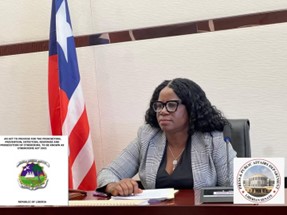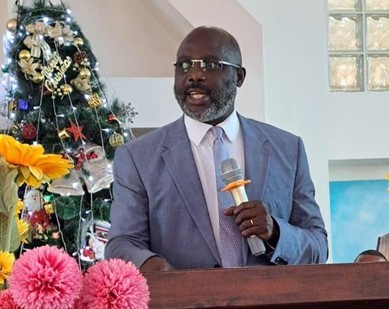The plenary of the Liberian Senate has tabled the Fouani Brothers Corporation’s US$30 million investment agreement, which seeks to build a crude palm oil (CPO) refinery in Liberia but with conditions that allows the investor to import vegetable oil as raw material and pay only general service tax (GST) and not duties, and to be exempted from import taxes and duties on capital equipment, spare parts, raw materials, consumables and packaging and related materials for seven years.
During the 52nd day sitting of the sixth session of the 54th Liberian Senate on Thursday, November 23, 2023, plenary received the report from the Joint Committee on Investment and Concession and Judiciary, Human Rights, Claims and Petitions on the “Investment Incentive Agreement between the Government of the Republic of Liberia and Fouani Brothers Corporation”.
After the committee’s report was presented, the plenary decided to put a halt to its passage for now. However, the Hot Pepper could not ascertain whether the Senate intends to trash-out the bill or pass it in subsequent sessions before the lame duck session comes to a close on December 15, 2023.
The incentive agreement has been described by several senators as deceptive and marred by dangerous clauses in many sections of the document that gives the “investor” an unimaginable considerations and leverages without any form of condition or limitation.
For instance, Section 10.1 (c) of the agreement allows for Fouani Brothers Corporation to import vegetable oil as raw material and pay only general service tax and not duties, which has met stiff resistance from stakeholders of the business sector as well as members of the Liberian Senate, some of whom are involved with oil palm farming in the country.
Stakeholders of the business sector have informed the Hot Pepper that the Fouani Brothers’ investment incentive severely undermines local farmers’ initiatives and undercuts existing investments in the palm oil sector that have been moving the country’s agricultural sector forward.
The business tycoons disclosed that there are large agricultural concessions that have invested in the palm sector, including Sime Darby, which has now been taken over by Mano Palm Oil Plantation (MPOP), Golden Veroleum Liberia (GVL), Equatorial Palm, etc., in addition to numerous other smaller palm farms owned by Liberians across the country. They say that all these agricultural projects have built or are planning to build refineries in Liberia in order to process crude palm oil from their farms.
According to them, by granting incentives to a large company to import CPO into Liberia duty free the government will be undercutting all of the investments in the palm oil sector in Liberia. “Fouani plans to import CPO from outside of Liberia where production costs are much cheaper. The CPO will then be refined in Liberia and offered for sale locally and abroad at much lower costs than the local plantations can produce. This will force local producers of CPO to sell to Fouani,” they forewarned.
Also, they say, this proposed investment incentive will create a monopoly that will force smaller producers out of the crude palm oil business and cause loss of investments already made in plantations and refineries and cause the workforce to be laid off, thereby increasing unemployment.
They strongly warned against the passage of the proposal in a lame duck session of the National Legislature, where at least fifty percent of the members have been replaced. “This session should be focused on the transition of leadership and members, instead of taking actions that will have long-term effects on the national economy and the livelihood of the people at large,” they emphasized.
“The proper option available to Fouani is not to try to undercut the palm oil market by getting duty free privilege on imports; instead, they should import CPO just as they do now, and refine it for local sale or export. Fouani should not be given duty free privilege to import CPO and thereby be able to produce refined oil cheaper than what the local producers can do,” they maintained.
Their stance was heavily backed by several senators during the committee’s hearing on the bill, terming the entire investment agreement as a bad deal for the country and its citizenry.
Senator Abraham Darious Dillion of Montserrado County argued that the loophole created in Section 11.1 could put Liberian farmers out of job. Section 11.1 reads, “Importation of Crude Palm Oil (CPO): In any event or under any circumstance reasonably unforeseeable to the investor, verified and validated by the Minister of Agriculture, that the volume of crude palm oil available in Liberia during the term of this agreement is of insufficient supply to meet the requirements of investor’s refinery, the investor may, with prior approval by the Minister of Agriculture, for a cumulative period not exceeding thirty-six calendar months for the six-year period commencing from the commercial production date, import into Liberia crude palm oil as is needed and required for investor’s operation free from import duties, provided that the thirty-six calendar months shall be used by the investor to invest in palm farming or the growing of palm in Liberia…”
Senator Dillon emphasized that if the company is given the leverage to import oil, they may not buy from the local farmers but use the loophole in the law to import oil, which could be cheaper, and put Liberian farmers out of business. He warned that the Senate needs to thoroughly look into that clause and do the needful.
Senator Emmanuel Nuquay of Margibi County argued that passing the investment incentive could mean putting Fouani Brothers Corporation in direct competition with Liberian farmers. He said he is of the belief that the importation of crude palm oil will be cheaper than buying from local farmers; as such, the investor may choose to maximize profit. He also expressed concern about the pricing of the palm oil, wondering whether the government will be involved in making price for locally produced oil.
Bomi County Senator, Edwin Melvin Snowe, described the Fouani Brothers Corporation Investment Incentive Agreement as a bad deal, and urged the Executive branch of government to withdraw the agreement to save the agriculture sector and the Liberian economy.
“The Executive should withdraw this agreement because it is bad for our economy, bad for local farmers and all companies who have invested millions of dollars in the palm oil sector, like Golden Veroleum, Mano Palm,” Senator Snowe stated.
Senator Snowe, who himself is a palm farmer, said it is impossible to produce 13,000 metric tons of crude palm oil a month in Liberia, and that is why Fouani is smartly asking for a plant for 13,000 metric tons—because it is impossible to get that amount.







